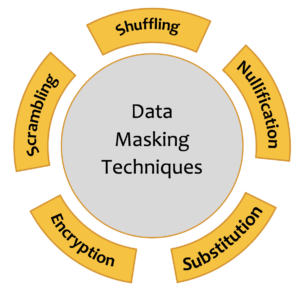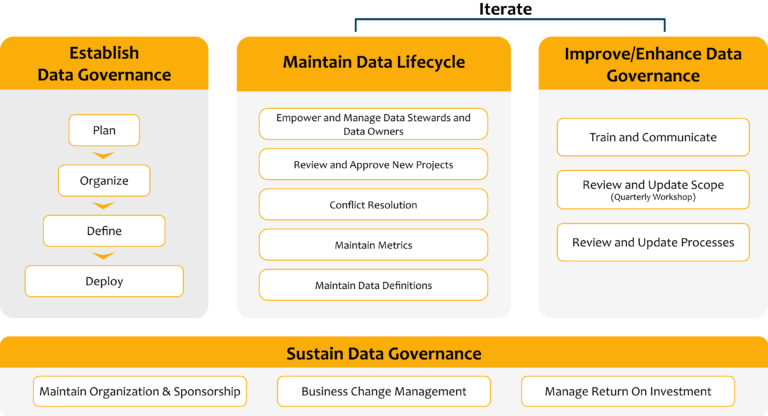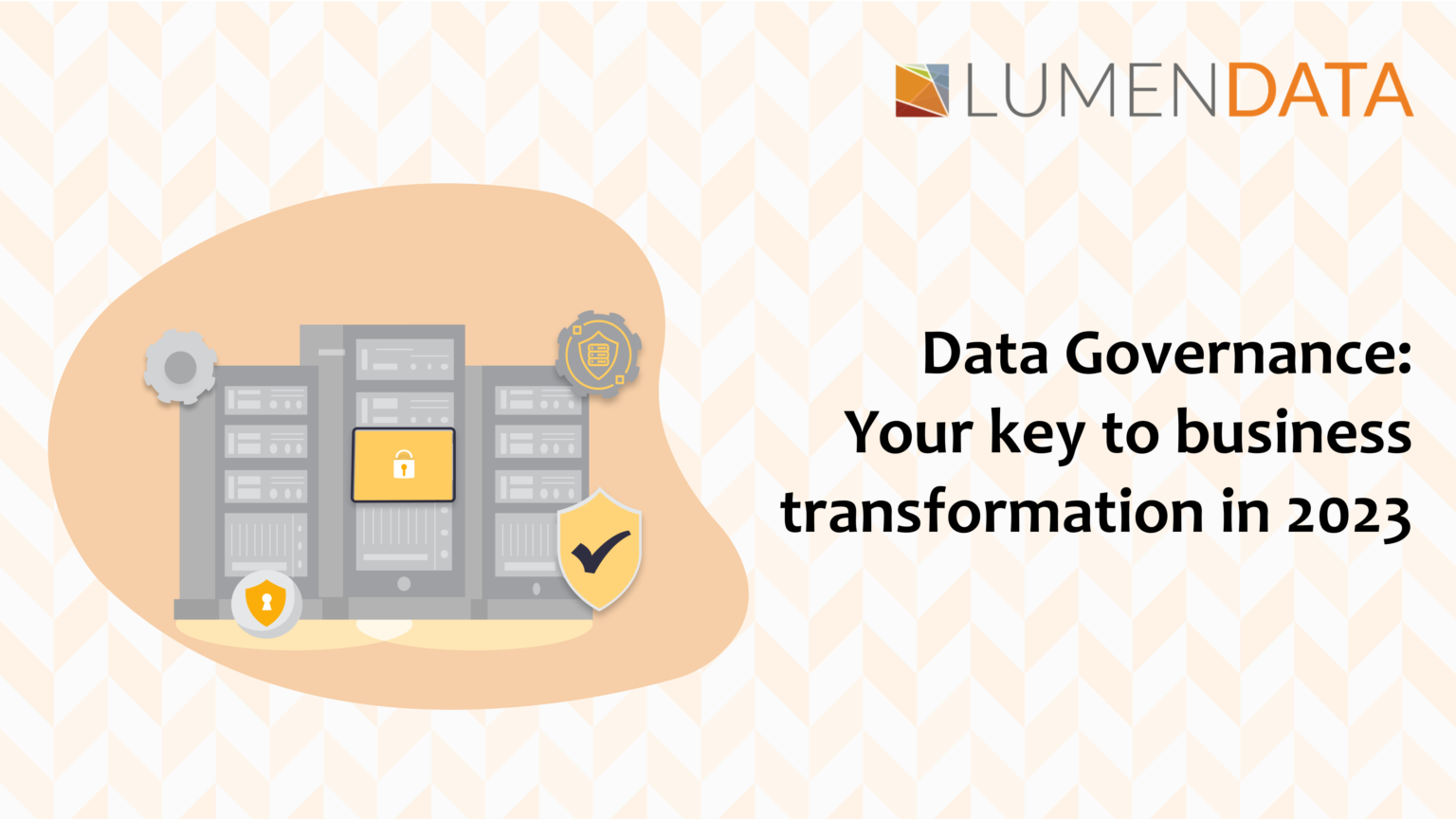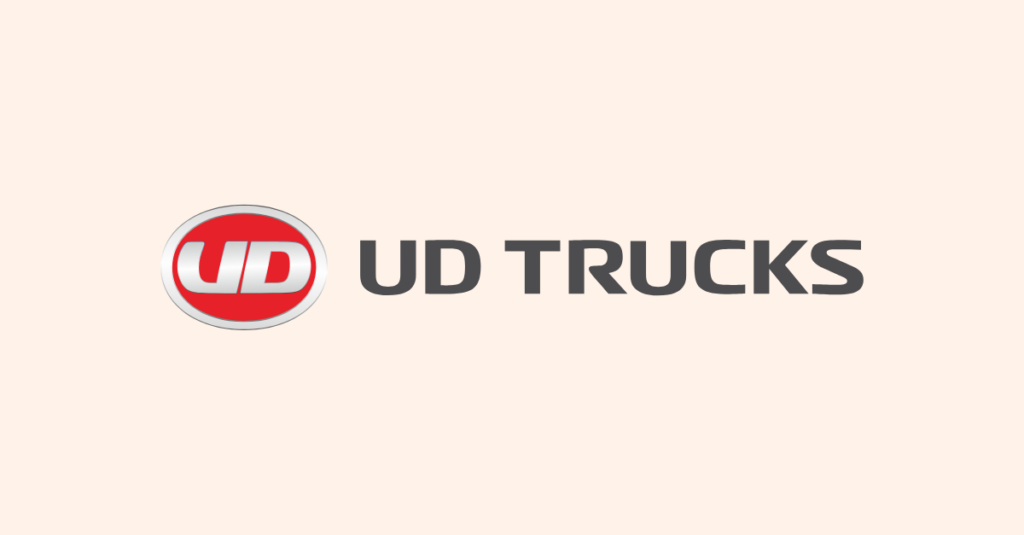In today’s modern times, the way businesses handle information is rapidly evolving. With data governance, businesses are able to identify data inconsistencies and break down data silos across the organization.
As per Markets And Markets research, the global data governance market size is expected to reach USD 5.7 billion by 2025 at a CAGR of 22.3%. This blog shall cover all the relevant concepts revolving around data governance and how it can help take your business to the next level. Read on!

Definition of data governance
Data governance is the sum of processes, policies, and standards to facilitate the appropriate use of business information. The data policies should be directed well toward how the data is collected, processed, stored, and disposed of. Businesses also need to comply with external standards defined by stakeholders and government agencies.
Simply put, data governance involves all the actions that you perform to ensure data security, privacy, accuracy, availability, and usability.
Top reasons businesses need to govern data
Absence of centralized enterprise data architecture within an organization results in the development of data silos. Here is exactly where data governance comes to the rescue. Let’s have a look at a few points that highlight how you can benefit from implementing a robust data strategy:
a) Be a master of timely business decisions
Data governance helps you ensure that your data is accurate and consistent. When you conduct effective data governance, it becomes easier to find, access, and leverage data. This further helps enhance your products and services, dig deeper into customer insights, and take timely business decisions to maximize revenues.
b) Meet regulatory compliances like a pro
Bid goodbye to the risks associated with non-compliance and save yourself from poor regulatory compliance. Data governance helps you design new compliances best suited to your business requirements. Data governance policies offer various ways to address the requirements of government regulations concerning data privacy. For example, GDPR, HIPAA, PCI DSS, and more.
c) Win greater customer trust
Right governance of internal and external data policies ensures the safety of sensitive information shared by your customers and partners. It enables you to build better business trust and optimize customer satisfaction.
d) Avoid security breaches
Data governance helps you keep a tab on where the data is coming from, where it is located, how it is leveraged, and who all have access to it. It prevents data exposure to unauthorized individuals and systems and alleviates data-related risks within your organization.
e) Win greater customer trust
Data governance helps eliminate data duplication that comes with data silos. It saves you from incurring unnecessary costs on maintaining expensive hardware.
Critical concepts around data governance
Data masking
Data masking is creating structurally similar data to your organization’s original data. The values are altered while the data format remains the same. Data masking protects sensitive business information and is a viable solution against data loss and data breaches. Moreover, it enables businesses to share data with authorized users like developers and testers without the fear of data exposure.
Organizations can leverage data masking to protect the following types of data:
- Personally Identifiable Information (PII)
- Intellectual Property
- Protected Health Information (PHI)
- Payment Card Industry Data Security Standard (PCI-DSS)

Let’s take a quick look at some of the most popular data masking techniques:
a) Scrambling
It reorders alphanumeric characters to hide the original data. Scrambling tends to jumble the numbers and characters into a random order. Example: When a customer complaint ticket with ID 12678 in a production environment undergoes scrambling, it could be presented as ID 71862 in some other environment.
b) Substitution
Considered one of the most effective data masking techniques, substitution involves the masking of data with another value while preserving the original look of the data. For example, you can use a random lookup file to hide customer names. The substitution technique can be applied to different types of data.
c) Shuffling
It means the reordering of values within a column. Shuffling masks the data in a column with some other data from the same column. This technique enables you to mask date, numeric, and string data types.
d) Nullification
It tends to replace the real values in a column with a null value. You can use the nullification technique to mask binary, date, numeric, and string data. However, the nullification technique makes testing and development environments more complex.
e) Encryption
This technique makes it impossible for unauthorized users to access data without decryption data. It enables you to use an encryption algorithm that masks the data. An encryption key is required to decrypt such data.
Data governance policies
A data governance policy is a documented set of standards that ensure consistent data management across the organization. The data standards are generally directed towards individual guidelines on data quality, security, access, usage, and roles to meet regulatory compliance.
Here are some data governance rules that a data policy should have:
a) Data access
All the guidelines that ensure appropriate data access to businesses come under the data access policy. This means that all individuals within an organization are granted data access according to their specific roles.
b) Data usage
This guideline mainly revolves around data privacy and compliance. It ensures that all data is leveraged ethically as per applicable data privacy laws. It also mentions the disciplinary steps that would be taken against individuals who violate the data rules.
c) Data integrity
The data integrity policy ensures data consistency within an organization. All essential data elements are integrated into various units and systems to ensure data accuracy at all business levels. Common data definitions are created to avoid data silos.
Best practices for data governance
Here are some pointers that you need to keep in mind:
- Data governance consists of components like people, processes, and technology. Look at one component at a time while keeping the big picture in mind. Select the right people to design processes and leverage the appropriate technology.
- Map your data governance goals tailored to your unique business requirements.
- Make sure to identify all data domains and measure progress. Keep a track of important metrics concerning data scope and sources.
- Ensure to establish a monitoring system to avoid data quality errors.
Advantages of collaborating with LumenData
With a special focus on addressing the processes involving technical implementation, LumenData approaches data governance in a pragmatic manner. We have a team of seasoned data management professionals with deep expertise across several data domains. LumenData provides you with industry-specific solutions. We help you leverage the power of MDM to develop the right data governance strategy for your business.
Here’s an overview of our data governance program:

Wrapping up
There is no denying that data is ruling the business world. It propels digital transformation and helps you stand out from the competition. Efficient data governance ensures that data is readily available, secured, compliant, of high-quality, and relevant to your business. Conduct data governance for your business and take the right step towards transformation and growth.
Our experts, at LumenData, can assist you in crafting the right strategy to achieve industry standard data governance. Get in touch with us without delay!

Shalu Santvana
Content Crafter

Ankit Kumar
Technical Lead

Shalu Santvana
Content Crafter

Ankit Kumar
Technical Lead





